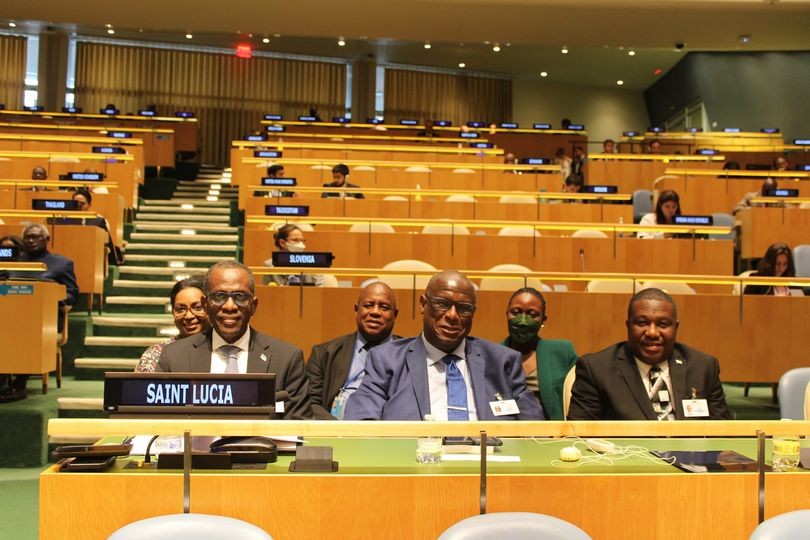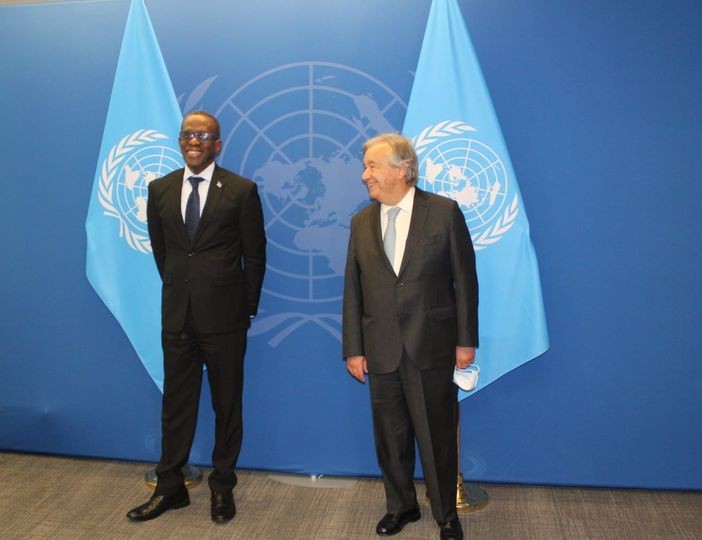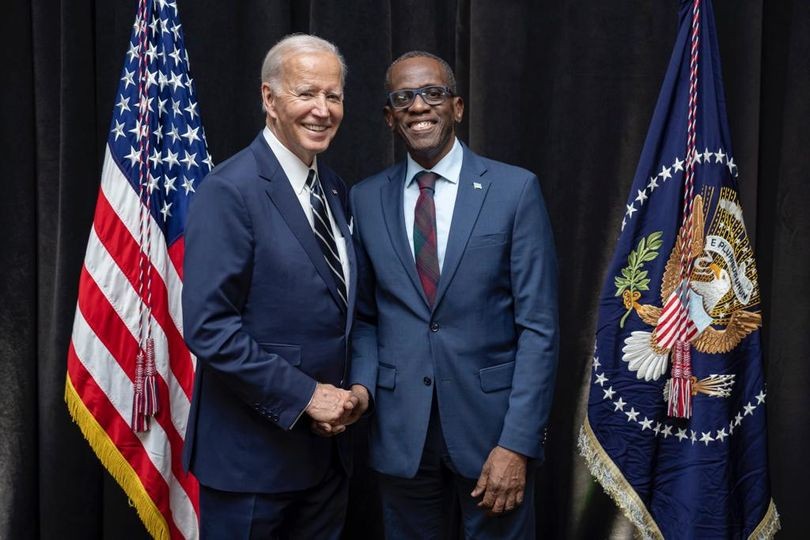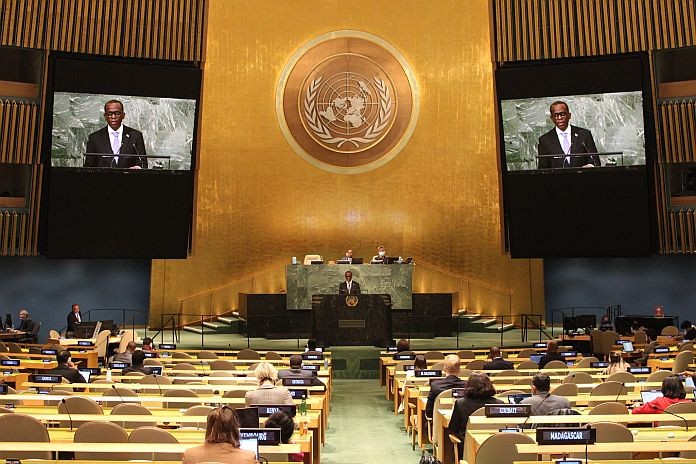-
-
- The following is the Prime Minister of Saint Lucia, Philip J. Pierre presentation at The 77th United Nations General Assembly (UNGA). Adapted for publication.
-
By Philip J. Pierre
I address this distinguished body with the democratic permission of the people of Saint Lucia, a small but proud state in the Eastern Caribbean … that our history and present circumstances, place upon us the responsibility of serving as voices of redemption and hope at times of crisis.
I agree with the theme under which this 77th Session of the General Assembly is being conducted – “A Watershed Moment: Transformative Solutions to Interlocking challenges.” Because, given the morbid developments in the contemporary global political environment it is reasonable to conclude that we deviated, to our detriment, from the course that the framers of the UN Charter had set for us.
It is for this reason that we have arrived at a watershed moment in history.
- We have arrived at this watershed moment in history because, we, the members of the United Nations have not adhered to the rules and principles of the Organisation that we created 76 years ago, as a multilateral answer to mankind’s propensity to use arms against his fellow man, instead of joining with him to turn them into tools for peace and development.
- We have arrived at this watershed moment, because, we have failed to adhere to the agreements we have negotiated multilaterally to solve the problems that have confronted us – problems invariably of our own making.
- We have come to this watershed moment, because small developing countries continue to suffer from an inequitable world order, in which the rich and powerful do not right the wrongs they commit against the weak.
Frustrating our development
Despite our small size, despite our deliberate desire to be a source of peace and friendship to all, despite our democratic traditions, and despite our earnest efforts to make the development of our people our primary objective, we find ourselves in a world stacked against us and frustrating our development at every turn.
Sadly, a survey of the global political economy of the last four decades reads like a cascading series of crises, and a frustrating tale of arrested development and dashed hopes for the people of the Caribbean.
In every decade since 1980, we have faced the ill winds of a harsh and global environment, to which we are forced to change course without reward, and with little to show for our efforts.
In the 1990s, it was the entry of the United Kingdom into the European Single Economy which removed any lingering protections from which we benefited and which placed us at greater exposure to a world of liberalized trade, with no consideration for our specific historical circumstances.
Then came the decade of the 2000s, in which the WTO was formalized and with which came an even harsher reality of trade liberalization that has not lived up to its promise of cheaper goods and services for all.
Instead, we have mostly witnessed declines in the demand for our primary commodities like bananas, sugar and rum. If anything, the new rules of trade have taught us harsh lessons on how global institutional arrangements are designed to punish us when we are accused of wrong, but fail to reward and protect us when we are wronged.
The experience of Antigua and Barbuda is instructive in this regard.
In the year 2001, we witnessed the terrorist attack on the United States of America which brought with it another round of negative economic circumstances: 9/11 was followed by the global financial crisis of 2008 – a crisis not of our own making – but one for which we in the Caribbean were amongst the hardest hit. Our tourism industries suffered tremendously as the financial losses in the main source markets resulted in a reduction of tourism traffic to our countries.
This tale of frustrated development continued in 2016 with BREXIT and was worsened by the COVID-19 Pandemic. Presently, the ongoing conflict between Russia and Ukraine has brought with it unseen hikes and uncertainty in the price of oil and has wiped out all of our hopes for a smooth recovery from the COVID-19 pandemic.
In addition, twenty years after the first conference on Financing for Development in 2002, the mechanisms and global frameworks we established through the United Nations financing for development process, tell a damning tale of gaps and shortfalls, commitments not kept, systematic barriers reinforced, and negative challenges.
Had our partners lived up to their commitments, our current circumstances of economic distress may not have been as dire.
Our diversification into financial services are threatened by an uneven regime of negative regulations. And, overarching all of this, are the continued challenges of climate change with its fierce occurrences of floods, droughts and hurricanes, adding yet more uncertainty to our economic projections and aspirations.
Climate change
It is no longer breaking news or a matter of debate that climate change is one of the biggest crises facing mankind today. But the solutions to the universal climate change emergency are not mystifying. From the 2015 Paris Agreement, where we agreed that limiting global warming to below 1.5° C would help us stay alive, to COP 26 in Glasgow, we have followed the science, negotiated, compromised and agreed upon the solutions.
The problem is that these agreements have been broken or simply ignored. Those who are the biggest perpetrators of the climate crisis and who were supposed to take the corresponding greatest action, have not followed through on their commitments.
The quantum of financing for climate justice, needed by developing countries and agreed upon by the developed countries, has not materialized. Other issues of the Paris rule book are still to be implemented.
The multilateral development financial institutions have yet to change their systems to make it easier for developing countries to access the financing required to adapt to climate change and build climate-resilient economies.
Developing countries; already saddled with debt, must be given the means to be able to deal with climate change. We must act together to save our people and our planet. It is regrettable, therefore, that recent political differences between two of the biggest polluting countries, have led to a halting of cooperation between them on climate issues.
The future of our planet must never be held hostage to the politics of superpower rivalry.
I want to take this opportunity to congratulate the Government and people of Grenada on the appointment of its former environment minister Simon Stiel, as the executive secretary of the UN Framework Convention on Climate Change, (UNFCC). The appointment of someone from a small island state is hopefully a signal that the world is listening to the pleas of the most vulnerable for positive and urgent action in this climate crisis. We urge the developed world to act upon the solutions to climate change that they have agreed upon.

A special regime for small island developing states
For decades … we have called on global financial institutions to carve out a special regime that takes into account our smallness and our vulnerabilities to climate change. This is not an unreasonable demand. We have insisted that many of the challenges that we face have come from the external environment and are not of our own making.
Given our small size and our miniscule levels of industrial pollution, we are among the least responsible for global warming, but given our small size and our vulnerable economies, we are among the most defenceless to the ravages of climate change. A single hurricane, which destroys our entire agricultural crop or destroys our tourism plant and infrastructure, can set us back by decades.
We are simply asking that these vulnerabilities be considered when our financial obligations for development assistance are being negotiated. This will result in the mutually beneficial solution of ensuring that the wheels of the global economy keep on turning, while at the same time allowing us the breathing space to participate meaningfully, with a renewed sense of faith in the legitimacy of the global financial system and its institutions.
For three decades, from the Adoption of Agenda 21, through to several General Assembly resolutions and the SAMOA Pathway, there have been calls for the adoption of a Multidimensional Vulnerability Index (MVI) for SIDS.
The MVI will replace the unreliable and unfair Gross National Income index that precludes SIDS from accessing badly needed low cost and concessional financing for their development. The work on the MVI by the UN and other institutions like the Caribbean Development Bank must now be accelerated and finalized.
A reform of the regime can no longer be ideological or political. We need to include the vulnerabilities of small states like Saint Lucia when calculating the value of their economies. This is a matter of survival for our people.
Ocean governance
We are disappointed that in another area of vital importance to Small Island Developing States – Ocean Governance – negotiations to adopt the first-ever multilateral maritime biodiversity treaty, stalled in August, because the developed countries of the North were once again unwilling to accommodate the needs of the developing world of the South.
Protecting the oceans is an imperative, and agreement on the sharing and sustainable use of the marine resources that are beyond national jurisdiction is essential. Bearing in mind, that these areas do not belong to one country but are the heritage of all mankind, Saint Lucia, therefore, calls for the urgent resumption of the Fifth Session of the Inter-Governmental Conference on the treaty, so that its text can be finalized, taking into account the special circumstances of small island developing states.
Global conflicts
Articles 2 and 33 of the UN Charter are unambiguous in binding Member States to refrain from the threat or use of force against the territorial integrity or political independence of any state and to negotiate and settle all international disputes by peaceful means.
In the Declaration on the Commemoration of the 75th Anniversary of the UN, heads of state and government reaffirmed those principles, when they said: “We will promote peace and prevent conflict. We will abide by international law and ensure justice.”
The war in Ukraine, has not only unleashed death and horrendous destruction but has plunged the world into an economic crisis of runaway inflation, catastrophic shortages of food and energy supplies and worsened a global supply chain crisis that had been triggered by the COVID-19 pandemic.
The world could have been spared this humanitarian and economic agony, if once again countries and their leaders had respected and adhered to the principles of the Charter of the United Nations.
We, therefore, call upon all parties involved to immediately end the conflict in Ukraine, by undertaking immediate negotiations to permanently settle all disputes in accordance with the principles of the United Nations.
The billions and billions of dollars being spent in Ukraine in wanton destruction and war could have transformed for the better, the economies, the livelihoods and the lives of millions and millions of people in the developing countries of the world, if spent on poverty reduction and economic transformation.
It is from this perspective, that Saint Lucia also laments the recent escalation of military tensions in the Taiwan Straits that threatened regional and international peace and security; and so Saint Lucia calls upon those responsible to observe the UN rules on peaceful settlement of disputes and respect for the territorial integrity and political independence of all countries.
The people of Taiwan have freely determined their political status and ought to be allowed to continue their chosen path to economic, social and cultural development and to confirm their right to self-determination. Saint Lucia calls for the meaningful participation of Taiwan in the organs and agencies of the United Nations.

Cuba, Venezuela and Haiti
Further, in the interest of peace and stability in the contemporary global political environment, we continue to call for the reduction of tension and the normalization of relations with our regional neighbours of Venezuela and Cuba.
And in this regard, in keeping with the Charter of the United Nations on a people’s right to self-determination and political independence, we once again call for the immediate removal of the inhumane economic embargo against Cuba.
Given the devastating impacts of the sanctions on the Venezuelan people, coupled with COVID-19 pandemic, and compounded by the expanding crisis of the world economy arising out of the war in Ukraine, let us also use this moment as a watershed for lifting the painful sanctions against the people of Venezuela. Let us work towards opening up a new period of prosperity for Latin America and the Caribbean.
In that vein, Saint Lucia wishes to register its grave concern over the continuing deterioration of the security situation and social circumstances in the Republic of Haiti. We will continue to engage with the rest of the CARICOM family, and the global community to facilitate a process towards normalization and ultimately the holding of free and fair and credible elections.
Illegal arms
While Saint Lucia and the rest of the Caribbean are not manufacturers of conventional weapons, our countries have been plagued by a proliferation of illegal small arms and light weapons, resulting in a surge in criminal activity and gun violence.
Saint Lucia has always been a strong advocate of the international frameworks, such as the United Nations Programme of Action to Prevent, Combat and Eradicate the Illicit Trade in Small Arms and Light Weapons in All its Aspects (UN-POA) and the Arms Trade Treaty; which are two examples of multilateral instruments aimed at mobilizing international cooperation to curb the illicit trade in conventional arms and ammunition.
Saint Lucia calls on the major manufacturers, exporters and importers of conventional weapons in our hemisphere to live up to their commitments, under these instruments, to lend the necessary expertise and technical assistance and cooperate in good faith to stem the tide of unregulated conventional arms and ammunition.
An agenda for the youth
In his report, “Our Common Agenda,” on the future of global cooperation, the UN Secretary-General has proposed several significant initiatives with regard to the Youth of the world.
The Report recommended more meaningful and effective engagement with the youth, including better political representation, transforming education, skills training and lifelong learning; and it proposed the establishment of a United Nations Youth Office and the appointment of a Special Envoy for future generations.
Saint Lucia welcomes these recommendations, and is encouraged by the adoption of the resolution to establish the youth office; as they are in keeping with one of the key priorities of my administration which I highlighted in my inaugural address to this general assembly – the creation of the youth economy.
I said then, that this novel youth economy, which would be formalized in a new government department under the purview of the prime minister, would be a catalyst for propelling our young people to turn their talents, skills and hobbies into economic enterprises for their own empowerment.
I am therefore pleased to announce that the legislation establishing our youth economy agency has been passed and will be formally launched this year.
As we call upon all Member States to support the UN Youth Office and Secretary-General’s’ other proposals on the youth, we once again invite the international community to discuss and engage with Saint Lucia, on mutually beneficial relationships and projects to promote the youth economy.
In the face of today’s drastic interconnected crises, let us all together harness the immense energy, enthusiasm, and creativity of our young people; let us capitalize on their resourcefulness; let us see them as assets and not as problems to be solved; let us consider their aspirations, for the future is theirs, not ours.

Conclusion
In this watershed moment, as we have described it, of interlocking challenges, we must all accept the truth, that it is the ordinary people of this world who matter, the youth in particular.
It is about the people whom we serve, who made us their leaders. It is they, the people, who must come first in all that we do.
And so, we have gathered at this 77th Session under the theme of “A Watershed Moment: Transformative Solutions to Interlocking Challenges” – A lofty and noble theme, indeed, pregnant with hope and towering expectations.
If we truly think of the people of this world, if we truly dedicate ourselves to serving them, then our words, our decisions, our actions will deliver, better health care, decent employment, decent housing.
As world leaders, let us practice servant leadership by faithfully adhering to and fulfilling the obligations of the Charter of the United Nations to which we all agreed to abide, when we became its members. Let us truly be nations, united!
Let us transform our attitudes and approach to the less privileged. The more powerful among us must honour international obligations and responsibilities.
Despite our small size, Saint Lucia stands here with the self-confidence of a people assured that our history and our own struggles for freedom have earned us the right to be a voice for all the developing and oppressed peoples of the world and we are confident, that we have something to share with the world at this time of crises.





